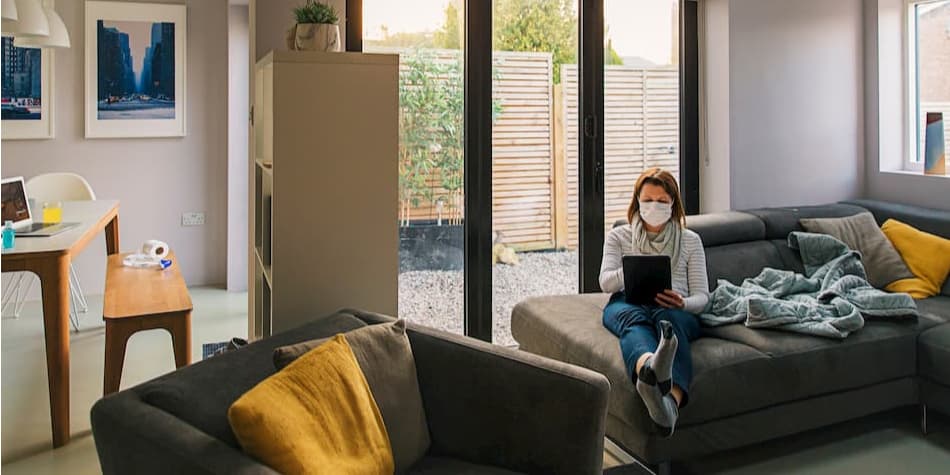
There is no doubt that the novel coronavirus poses a major threat to the entire U.S. economy and the health of our nation as a whole. It’s normal to feel stressed, sad, or worried about COVID-19, especially if you or your loved one is at risk or sick. Remember, there is no right or wrong way to cope, and everyone deals with stress differently.
In my practice as an oncology counselor working with individuals who are newly diagnosed, I am used to examining with my clients any and all of their fears and concerns about approaching surgeries, chemotherapy, radiation, how to manage complex information, and having to make critical decisions in a short period of time. For 17 years, I have been navigating these conversations, but never in my time have I experienced the situational overlay of a global pandemic. In my naivety, at the beginning, I assumed that my practice would continue as usual. I see now that I was wrong.
I thought that transitioning my practice from office visits to telephone sessions would be my only obstacle. The telephone, I guessed, would offer less data; I would not be able to rely on all of the kinetic and non-verbal cues that, as a practitioner, I have relied on to gather insight into my client’s inner self, such as eye contact, body shifts and squirms, fidgeting, etc.
What I have discovered is that my phone sessions may be working better than counseling in my office ever did. The sessions on the phone in the last seven months have been some of the most rewarding of my professional career. Over this new medium, I discovered that the data I gathered with my clients has tended to be richer and, together, we have been able to get to a deeper level, faster. It is as if the phone was creating enough of a sense of anonymity that the perception of being judged was lifted, and my clients felt free to express and explore with greater freedom.
I have found that my clients have consistently come away from our time together with a pleasant and surprising sense of their own empowerment and resiliency as they have worked through their identified issues. And I have come away from those same appointments with the clarity that counseling is not always about the nice office or the angle of the seating arrangement, because good counseling has always been about making meaningful connections in a therapeutic alliance.
As if being diagnosed with cancer during a pandemic was not enough for anyone. I have long said that life happens even when you have cancer. Family happens, marriage happens, conflicts occur, past trauma and losses play a role. People do what they can. But now my clients and I speak to the fear associated with having to enter into their infusion centers without the comfort of having a family/companion. Pervasive fears about being immunocompromised and therefore having to be extra mindful about infection. Diagnostics being performed in a quiet room with only a technician. Disease progression being delivered alone or over a telehealth platform. Domestic violence in a time of social isolation. Isolation from community, friends, family, children, and grandchildren. Loss of roles and duties once performed within the family system, due to disease. Devastating levels of grief and anxiety. Financial stress. These are just a few of their fears and concerns.
Mental health professionals aren't immune to the disruptions caused by this pandemic either. Therapists and counselors are facing the same anxiety, uncertainty, and financial stress that are troubling those who seek our services. My personal self has entered into the professional relationship at many occasions. To say any different would be to deny the reality of this current lived situation. As much as I try to remain “neutral outside” in these conversations, I too am very much living in the collective loss that our society has been facing.
I have been listening to a lot of podcasts over the past seven months and I reflect on a conversation that Brene Brown[1] was having with David Kessler when he said, “We are all dealing with the collective loss of the world we knew … the pandemic, for most of us, has been catastrophic and mundane at once … our days are an accumulation of microsadnessess: the eighth grade graduation canceled, the morning coffee run halted, the long-awaited vacation delayed.”
Most of the work I do with my clients emphasizes building resiliencies, cognitive restructuring to reduce catastrophic thinking, generating alternative considerations as a way to work towards reducing anxiety responses and emotional lability. Throughout the course of their cancer experience, I typically encourage my clients to focus on what they can control, and let go of what they cannot. I am finding that I am applying the same principles to their concerns about the COVID-19 pandemic. Encouraging them to create routines and structures throughout their day. Limiting the amount of media and/or social media about the virus, or current social/political/economic environment, that they consume during the day. Exercise wherever possible and safe. Try to maintain healthy and balanced eating patterns. Get plenty of sleep. Maintain social contact with family, friends, and community using devices wherever possible, or arrange social distancing visits.
I frequently tell my clients this is not forever, this is just for now … I am now telling myself the same. That the only way I can continue to be a present and effective counselor is to remind myself that this is all of us.
[1]Brene Brown: Unlocking Us: March 31, 2020 [podcast]